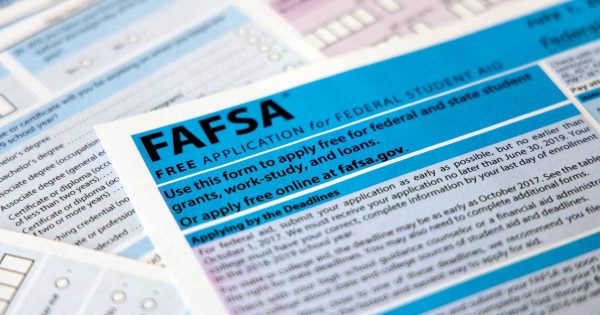Seniors anxiously checking college portals. The nervous discussion of deadlines. Friends celebrating in the Old Library. A wall overflowing with rejection letters. Throughout Urban, the signs of college decision season are hard to miss. But because of this year’s flawed government rollout of the Free Application for Federal Student Aid (FAFSA) — the form all U.S. colleges use to determine financial aid — acceptance is only the first step for many students. Even if accepted to their dream schools, millions of seniors across the country — including 39 Urban students — do not know whether or not they can afford to accept their offers of admission.
“There are some schools that I would be happy to go to, but I don’t know my financial situation,” said Sephora Haileselassie ‘24. “I can’t get too happy.”
FAFSA is a government form students must complete to receive financial aid from colleges and universities. In 2020, Congress passed a bill that sought to make the financial aid application process simpler by the 2023-2024 application year by reducing the number of questions on the form from over 100 to around 30.
FAFSA was late from the beginning. While the rollout was meant to fall on Oct. 1, students could not fill out the form until months later. “It’s been delayed so many times. I was told that originally [it] was gonna be released in October,” said Linda Ye ‘24. “And then it was Jan. 1 that it actually opened.”
After months of extra development, bugs and crashes still plagued the online system. “When I first got on [the FAFSA site] I remember that it just kept crashing,” said Ye. “It was just like, ‘Hey, you can’t fill out the form right now.’ I [kept] having to reload it and check [it] every single day.”
While the original rollout was delayed because of an issue with General Dynamics Information Technology, the four companies contracted to build the new FAFSA system pointed fingers at one another for the lack of testing and an abundance of issues with the technology. No one has taken official responsibility for the delays, but the Government Accountability Office opened an investigation into the cause of the crisis in early February.
Most students are now slated to receive their financial aid packages from colleges in May, while the deadline to accept a college’s offer is usually by the end of April. Though around 200 colleges, including all University of California schools, pushed their decision deadlines back, many colleges still have not extended them.
In an interview with The Urban Legend, Erika Coplon, Program Director for a college access program for underserved students called Matchlighters Scholars Program, said, “Right now, my students should be celebrating and worrying about which college they’re going to. But in reality, a lot of them are worrying about whether they can afford college at all.”
“Students who would normally have financial aid awards in hand right now have nothing,” said College Counselor Lauren Gersick.
For many, the FAFSA delays add a significant level of uncertainty to an already stressful process. “In the back of my head, I’m always stressing about it,” said Selena Corpuz ‘24. “What if I just play this waiting game, and the financial aid I get is bad?”
“[Many students] got into [a] good school and really want to go there. And then it comes down to the financial aspect,” said Grethel Escobedo, program director at Mission Graduates, a program helping youth in the Mission apply to college, in an interview with The Urban Legend. “If [they’re] not going to be able to pay for the school, what [are they] going to do?”
“I know where I want to go. But I can’t make any decisions because [FAFSA is] taking too long. It’s really sad. It’s really frustrating,” said Corpuz. “You can’t be excited and show off where you might be going because you might not end up there anyway.”
According to Gersick, it’s possible that colleges have been forced to waitlist students who applied for financial aid, creating yet another barrier to entry for higher education in the United States. “Some students who may have been admitted in a standard year are seemingly being put on waitlists because colleges aren’t sure how their actual financial aid budgets will play out and can’t admit students who they will not actually be able to fund,” said Gersick.
According to Coplon, the FAFSA delays this year will deter many first-generation students from applying in the future. “Most of my students are first-generation college students,” she said. “There’s this imposter syndrome. … Not even being able to fill out the form for financial aid just confirms that belief of ‘I don’t belong here.’”

Financial aid delays hit students hard
April 21, 2024
About the Contributor

Oliver Yeaman, News Editor
